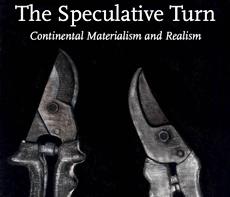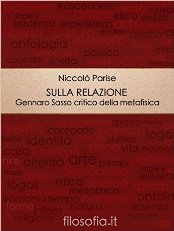The Speculative Turn: Continental Materialism and Realism

Levi Bryant, Nick Srnicek and Graham Harman, editors
re.press Melbourne 2011
![]() libro in pdf
libro in pdf
This anthology assembles more than two dozen essays by many of the key figures in present-day continental philosophy. They hail from thirteen countries, speak seven different native languages, and are separated from eldest to youngest by a range of more than forty years. (The collection would have been even more diverse, if not that several additional key authors were prevented by circumstance from contributing.)
A number of well-established authors can be found in the pages that follow, joined by various emerging figures of the younger generation. These are exciting times in our field. No dominant hero now strides along the beach, as the phase of subservient commentary on the history of philosophy seems to have ended. Genuine attempts at full-blown systematic thought are no longer rare in our circles; increasingly, they are even expected. And whatever the possible drawbacks of globalization, the new global networks have worked very much in our favour: enhanced technologies have made the blogosphere and online booksellers major contributors to a new ‘primordial soup’ of continental philosophy. Though it is too early to know what strange life forms might evolve from this mixture, it seems clear enough that something important is happening. In our profession, there has never been a better time to be young.
The first wave of twentieth century continental thought in the Anglophone world was dominated by phenomenology, with Martin Heidegger generally the most influential figure of the group. By the late 1970s, the influence of Jacques Derrida and Michel Foucault had started to gain the upper hand, reaching its zenith a decade or so later. It was towards the mid-1990s that Gilles Deleuze entered the ascendant, shortly before his death in November 1995, and his star remains perfectly visible today. But since the beginning of the twenty-first century, a more chaotic and in some ways more promising situation has taken shape. Various intriguing philosophical trends, their bastions scattered across the globe, have gained adherents and started to produce a critical mass of emblematic works. While it is difficult to find a single adequate name to cover all of these trends, we propose ‘The Speculative Turn’, as a deliberate counterpoint to the now tiresome ‘Linguistic Turn. The words ‘materialsm’ and ‘realism’ in our subtitle clarify further the nature of the new trends, but also preserve a possible distinction between the material and the real.
Following the death of Derrida in October 2004, Slavoj Žižek became perhaps the most visible celebrity in our midst, eased into this role by his numerous publications in English and his enjoyable public persona. To an increasing degree, Žižek became closely linked in the public mind with his confederate Alain Badiou, whose major works were increasingly available in English during the first decade of the century, with a key
assist from Peter Hallward’s encyclopaedic survey, Badiou: A Subject to Truth.1 It is probable that Badiou and Žižek are the most widely read living thinkers in Anglophone continental philosophy today. But others of their approximate age group have entered the mix as well, championed initially by smaller groups of readers. Bruno Latour, already a giant in anthropology, sociology, and science studies, was smuggled into continental
philosophy by way of the ‘object-oriented ontology’ of Ian Bogost, Levi Bryant, and Graham Harman. Somewhat ironically, Latour’s longtime intellectual friend Isabelle Stengers followed a rather different path into the Anglophone debate, by impressing the younger Deleuzians with her work on Deleuze and Whitehead, and with her own series of books known as Cosmopolitiques.2 The ‘non-philosophy’ of Francois Laruelle has captured the imagination of many younger readers, despite relatively little of his work
being available in English so far. This rising generation of Laruellians has also tended to show great interest in cognitive science and the various practitioners of ‘neurophilosophy’.
Another important year was 2002, when Manuel DeLanda in Intensive Science and Virtual Philosophy3 and Graham Harman in Tool-Being4 both openly proclaimed their realism, perhaps the first time this had been done with a straight face in the recent continental tradition.5 A half-decade later, this explicit call for realism was reinforced by what is so far the best-organized movement of the next generation. Inspired by the publication of Quentin Meillassoux’s Après la finitude6 (After Finitude) in early 2006, the first Speculative Realism event was held in April 2007 at Goldsmiths College, London.
The original group included Ray Brassier, Iain Hamilton Grant, Harman, and Meillassoux; Alberto Toscano was moderator in 2007 and Meillassoux’s replacement at the follow-up event at Bristol in 2009. But while the group has already begun to break into various fragments, it remains a key rallying point for the rising generation of graduate students. Thanks to the recent importance of the blogosphere, and the aggressive acquisitions policies of new publishers such as zerO Books, many of these students are already
surprisingly well known. The editors of this volume are pleased to have Nick Srnicek on board as a fitting representative of this group.
Cerca tra le risorse
 Giornale Critico di Storia delle Idee
Giornale Critico di Storia delle Idee La filosofia futura
La filosofia futura
Rivista di filosofia teoretica
__________MULTIMEDIA__________
![]() VIDEO
VIDEO
Filippo Mignini
Spinoza: la potenza della ragione
(Emsf)

Gennaro Sasso
Giovanni Gentile: la filosofia, la politica
(Treccani Channel)
Focus
-
 Laicità e filosofia Che cosa significa essere laici nel nostro Paese, dove forte è l'influenza politica della Chiesa? Grandi personalità del pensiero e della cultura riflettono, per la prima volta insieme, su questa questione...vai alla pagina
Laicità e filosofia Che cosa significa essere laici nel nostro Paese, dove forte è l'influenza politica della Chiesa? Grandi personalità del pensiero e della cultura riflettono, per la prima volta insieme, su questa questione...vai alla pagina
- 1
- 2









